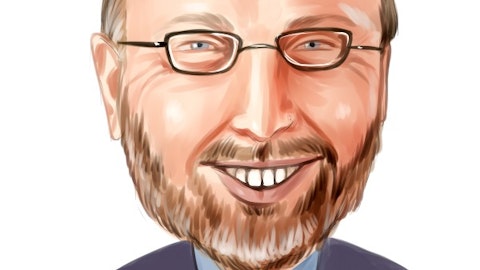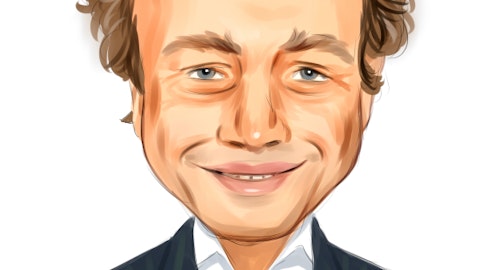Carl Hess: Yes. So, if you look at our global lines there. In general we’re having great success in the marketplace, probably the biggest differentiator is what’s happening in rate. And I think it’s pretty well known that D&O market particularly has seen significant rate reductions which does have an effect on our overall revenue in the area. So, good results despite a headwind from rate in that particular line. We are seeing very good success across all our global lines. And I think it’s — what we say is, where we specialize we win and that’s a good testament to that. Probably the other area I call out is facing a headwind has been in our M&A business where simply there’s been much less M&A activity. And so as a result our revenues in the area along with everybody else have been under pressure. Of course this is a very interest rate sensitive business, so we’ve seen some benefit on the interest income side of the balance sheet that mitigates that.
Andrew Krasner: Yes. And we did see solid performance across the broad portfolio, across all geographies. We did have a large increase in new business which we were very happy to see and versus prior year, and we also had really strong retention rates which did contribute to the top line. And we do see very clearly the benefits of the specialization and focus, and we did see double-digit growth across almost all of our global lines of business this quarter.
Michael Ward: Awesome. Thanks. And then maybe the cash flow improvement in the quarter. It was up over $200 million. I think with $75 from working capital. Just wondering any actions you can call out, and if you could quantify the transformation in cash flow impact?
Andrew Krasner: Yes. So the improvement of 370 was primarily due to the non-recurrence of some of the prior year headwinds. We talked a little bit about the FX hedges, discretionary comp payments made in the past and some taxes. And those tailwinds were partially offset by the increased transformation program related costs. We’re continuing to expect an incremental increase of approximately $150 million in cash spent related to the transformation program and that’s for the full year.
Operator: Thank you our next question or comment comes from the line of Mark Marcon from R.W. Baird. Mr. Marcon, your line is now open.
Mark Marcon: Good morning Carl, Andrew, I’ve followed you since the very first days of Watson Wyatt. I don’t think I’ve ever seen a quarter where we had such a broad based improvement with regards to the organic growth rates across every single line of business. I’m wondering, was there anything that has changed internally in terms of incentive systems, discussions with regards to goals objectives that led to such a broad based improvement. You mentioned that you’re becoming more disciplined in terms of T&E. But I’m wondering if that’s part of a broader focus on operational discipline?
Carl Hess: We are trying to become a more disciplined organization. I think I’ve been saying that since we first announced the grow, simplify, and transform program in late 2021. We are – I’m very proud of the efforts that our colleagues have made to produce these results. And not me and Andrew, that is 46,000 plus of us all pointing in the right direction. And it’s nice when the stars align. But no, there’s nothing in terms of underlying change in compensation programs, et cetera, that’s driving this. It’s 46,000 people’s part.
Mark Marcon: It’s always interesting when 46,000 all change over the course of a couple of quarters. So, the second question is, the guide for the full year basically implies a de-sell [ph]. You mentioned that is conservative. Obviously, BDO and TRANZACT are a huge swing factor with regards to the fourth quarter. Can you just discuss – we only have two months and a few days left in this quarter. Can you just discuss how does the enrollment season look? What are the trends? Is that the biggest swing factor that is basically keeping you from raising the full year guide given the strong momentum that we currently have?
Carl Hess: Yes. I think it’s still way too early in enrollment season to make any predictions about trend, et cetera. We’ve been at this a while and I think it’s a bit of a mug scheme. With respect to how we think demand is within the businesses. I think we alluded to that at a reasonably detailed level earlier in the call. There is some activity that we enjoyed during the summer, especially with respect to benefit redesign and de-risking that just — we don’t expect to be as big a force in Q4. And the, BDO will do what BDO does in enrollment season.
Operator: Thank you. Our next question or comment comes from the line of Mark Shields from KBW. Mr. Shields, your line is now open.
Mark Shields: Great. Good morning. Can you hear me?
Carl Hess: Yes, Mark.
Mark Shields: Okay. Sorry. My phone’s been a little bit lumpy today. I guess first question, with respect to TRANZACT, I understand that it’s still sort of generating negative cash flows. Do we have line of sight in terms of when the annual negative cash flows don’t get worse on a year-over-year basis?
Andrew Krasner: Sorry, I’m trying to answer your question. When it won’t get worse on a year-over-year basis?
Mark Shields: Right. In other words, I’m looking at two hurdles. One is, ultimately, cash flow positive. But before that, I would imagine that it generates negative cash flow, but not as much as the prior year?
Andrew Krasner: Yes. That’s right. It’s becoming incrementally better every year until we get to being cash flow positive. So we do expect a positive trajectory from that business as we evolve the portfolio and take other actions.
Mark Shields: Okay. And I just want to clarify something, because I may be misinterpreting it. On the last quarter call, I think, when you talked about some of the non-transformational expense efforts, the expectation was that would be clearer in the fourth quarter than in the third. I just want to see whether that’s still the case or whether it proved out faster than expected?
Andrew Krasner: Yes. I think some of it did prove out faster than expected, but we do expect that benefit to carry through to the fourth quarter. There may be a bit more to go there in some of the areas, but I’m very happy with the progress that we’ve made so far.
Operator: Thank you. Our next question or comment comes from the line of Brian Meredith from UBS. Mr. Meredith, your line is now open.
Brian Meredith: Hey, thank you. Carl, I’m just curious. Nominal GDP has stayed, I think, better than people anticipated, although I know there’s some people saying that it’s going to slow down at some point next year. What are your clients saying? What’s your crystal ball looking at on nominal GDP? And then, how does it factor into your 2024 guidance? Maybe you can just remind us on that, particularly with respect to revenues?
Carl Hess: Yes. As a company, we are well-positioned to weather macroeconomic uncertainty. And I think if you’re asking a prediction for me on GDP, I think it’s uncertain, but there’s a range of actions that I think we’re actually in pretty good shape to handle. Both WTW and our predecessor companies have been able to grow revenue during recessions. Our clients are facing many uncertainties in this macro environment. Some of our clients have to navigate rising, sustained rising commercial insurance rates that the industry has been enduring amidst the current conditions. Insurers are still pushing for premium increases, and that causes even greater challenges for our clients as they try and navigate complex risks. But our customized tools, our specialist approach in R&B ensures that the clients get the best return for their premium dollars across the entire portfolio of risk.





